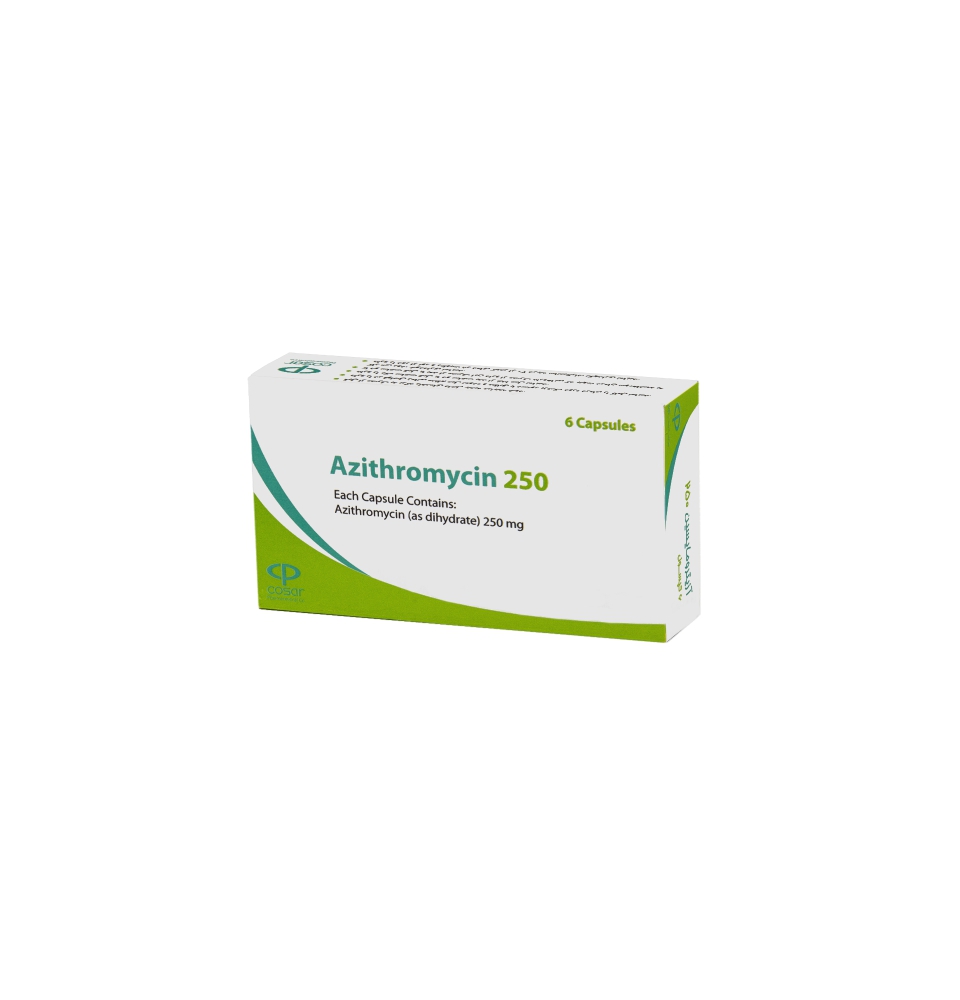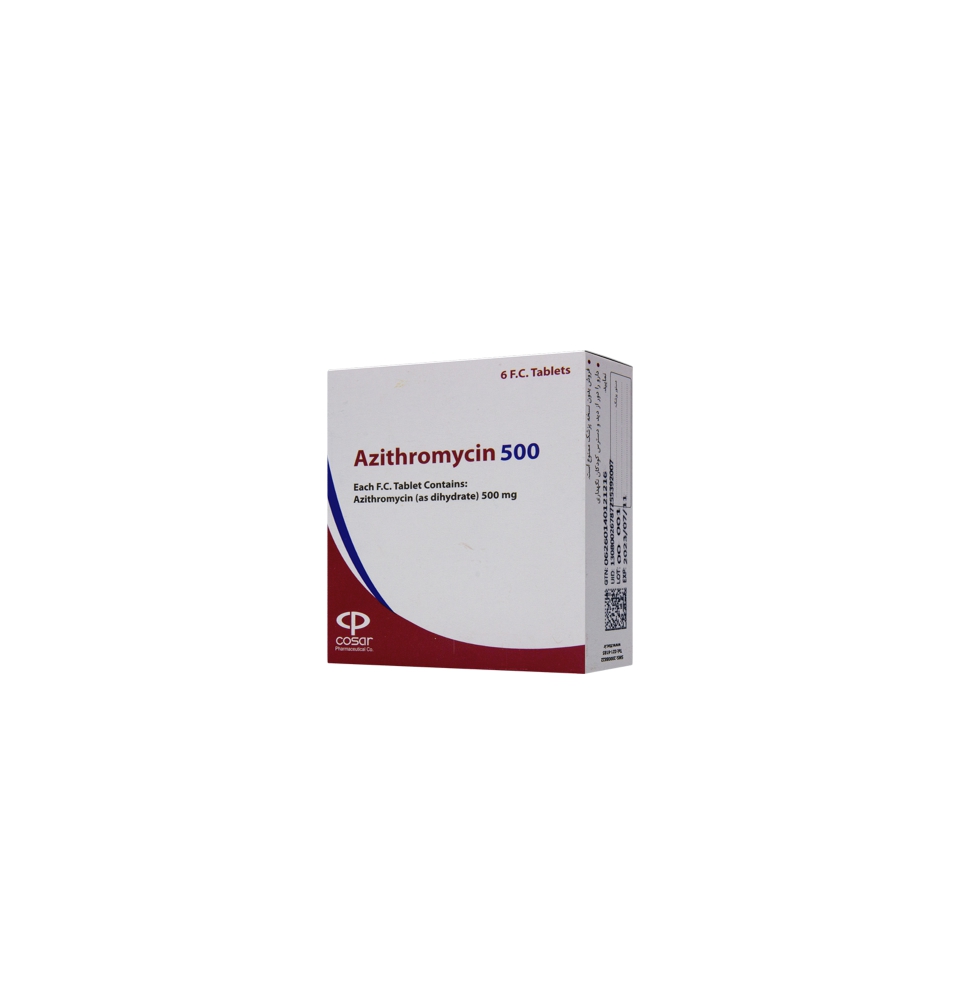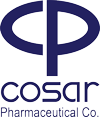


Azithromycin
It inhibits RNA-dependent protein synthesis in the phase of chain elongation; It binds to the 50S ribosomal subunit, which suppresses transpeptidation. This medication has no effect on nucleic acid synthesis. It becomes concentrated in phagocytes and fibroblasts; In-vivo studies show that this increase in concentration in phagocytes can help in drug distribution to inflamed tissues.
Description of Azithromycin
Azithromycin Cosar
Azithromycin Cosar
Antibacterial medications
Anti-infective drugs < antibacterial drugs < macrolides < other macrolides
Tablets and capsules
250 mg
500 mg
The mechanism of action:
It inhibits RNA-dependent protein synthesis in the phase of chain elongation; It binds to the 50S ribosomal subunit, which suppresses transpeptidation. This medication has no effect on nucleic acid synthesis. It becomes concentrated in phagocytes and fibroblasts; In-vivo studies show that this increase in concentration in phagocytes can help in drug distribution to inflamed tissues.
Azithromycin is used in the treatment of respiratory tract infections, otitis media, skin and soft tissue infections, genital infections without chlamydial consequences, and non-gonococcal urethritis.
Group B
Can be used in pregnancy: Animal studies have not shown any evidence that this drug is dangerous. Not enough human studies are available.
General characteristics of interactions:
Azithromycin has fewer interactions than other macrolide antibiotics and can interact with medicines such as antiarrhythmics, many antacids, and statins. Before starting azithromycin, consult your doctor and pharmacist about all the medicines and supplements you take.
– Under the influence of delayed gastric evacuation
– Changes in the flora of the digestive tract
– Binding to multivalent cations
– Impaired immune response against bacterial agents
– Increased known QT interval
Category X interactions to avoid:
BCG, cholera vaccine, doxorubicin (common), Mizolastine, pimozide, strong QT prolonging CYP3A4 inhibitors (moderate risk), topotecan, vincristine (liposomal)
Increasing the effects of drugs by azithromycin (systemic):
Afatinib, Aliskiren, atorvastatin, cardiac glycosides, chloroquine, colchicine, cyclosporine (systemic), dabigatran, Demperidone, doxorubicin (common), etoposide, everolimus, haloperidol, Inotuzumab, Ozogamicin, lovastatin, Midostaurin, Mizolastine, morphine (systemic), nadolol, Ondansetron, pazopanib, pentamidine (systemic), QT-prolonging antipsychotics (moderate risk), QT-prolonging class IC antiarrhythmics (moderate risk), QT-prolonging quinolone antibiotics (moderate risk), ranolazine, rifaximin, risperidone, simvastatin, sirolimus, tacrolimus (systemic and local), Tegaserod, tolvaptan, topotecan, vincristine (liposomal), vitamin K antagonists
Increasing the effects of azithromycin (systemic) by medicines:
Amisulpride (oral), fexinidazole, nelfinavir, pimozide, QT-prolonging drugs (highest risk), QT-prolonging antidepressants (moderate risk), QT-prolonging kinase inhibitors (moderate risk), moderate and strong QT-prolonging CYP3A4 inhibitors (moderate risk)
Reducing the effects of medicines by azithromycin (systemic):
BCG vaccine (immunogenic), cholera vaccine, lactobacillus and estriol, sodium Picosulphate, typhoid vaccine
Reducing the effects of azithromycin (systemic) by drugs:
No significant interference has been identified.
Interference with food:
The amount and speed of gastrointestinal absorption may vary depending on the type of formulation. Absorption of azithromycin suspension (and not its tablet) increases significantly (46%) when taken with food.
Remedy: Quick release tablets and suspension can be taken regardless of food. Slow-release suspension should be taken on an empty stomach (1 hour before or 2 hours after a meal).
If the patient suffering from liver or kidney disease, ventricular tachycardia and porphyria, it should be taken with extreme care.
In case of liver failure, this drug should not be used.
Common complications >10%
Gastrointestinal: diarrhea, nausea, vomiting
Relatively common side effects (1-10%):
Cardiovascular: chest pain, facial edema, heart palpitations
Skin: increased perspiration, eczema, fungal dermatitis, itching, skin sensitivity to light, skin rash, urticaria, vesiculobullous dermatitis.
Endocrine and metabolism: decrease in serum glucose, increase in gamma glutamyl transferase, increase in lactate dehydrogenase, increase in serum glucose, increase in serum potassium
Gastrointestinal: abdominal pain, anorexia, constipation, taste disturbance, indigestion, enteritis, flatulence, gastritis, melena (dark bloody stool), oral candidiasis, stomatitis
Genitourinary: genital candidiasis, vaginitis
Hematology and oncology: Anemia, increased eosinophil level, increased neutrophil level, leukopenia, lymphocytopenia, lymphocytosis, increased blood platelet level, Monocytosis
Hepatic: cholestatic jaundice, increase in serum level of alanine aminotransferase, increase in serum level of aspartate aminotransferase, increase in serum bilirubin, jaundice
Hypersensitivity: angioedema, hypersensitivity reaction
Infectious: fungal infection
Local: local inflammation, injection site pain
Nervous system: agitation, dizziness, drowsiness, fatigue, headache, insomnia, boredom, anger, pain, dizziness
Nervous, muscular and skeletal: muscle hyperkinesia, increased creatine phosphokinase in blood samples
Renal: increased BUN, increased serum creatinine, nephritis
Respiratory: bronchospasm, cough, pulmonary edema
Miscellaneous: Fever
Rare complications <1%
Endocrine and metabolism: increase in serum bicarbonate, increase in serum phosphate, decrease in serum potassium, decrease in serum sodium
Hematology and oncology: increased basophil level, neutropenia
Hepatic: increased serum level of alkaline phosphatase
According to the different forms of azithromycin, the recommendations of this medication are expressed according to the drug form:
Azithromycin 500 tablets/ Azithromycin 250 tablets/ Azithromycin 500 capsules/ Azithromycin 250 capsules
– You can take the medicine with food.
– Avoid driving and other activities that require complete concentration and alertness for 2 hours after taking the medicine.
– Avoid taking antacid syrups containing aluminum and magnesium for at least 2 hours away from taking this medicine.
Inform your doctor if you are taking any heart medication.
– Long-term watery diarrhea with heartburn for several weeks after treatment may be a rare side effect of this medicine. Avoid self-medication.
– If you notice signs of severe inflammation of the skin, mouth or eyes, stop taking the medicine and see a doctor immediately.
It is better to take this medicine (especially its capsules) with an empty stomach, but in case of digestive irritation, you can take the medicine with food.
Store at a temperature below 30 degrees Celsius, in the original packaging, away from direct sunlight and moisture.
